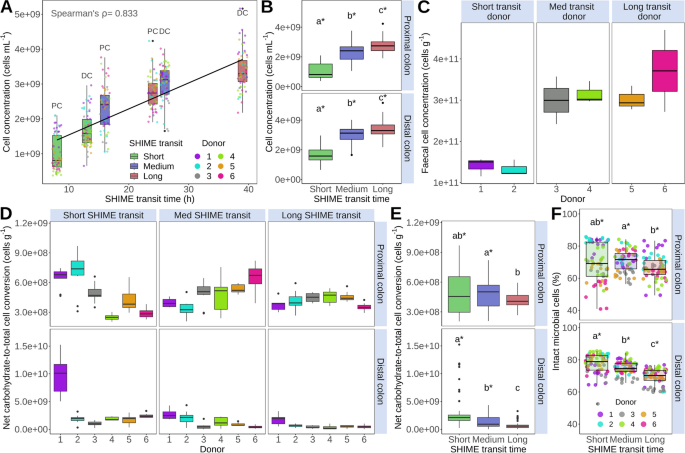💡 The study investigated the role of gut transit time in shaping the human gut microbiome, a key factor often confounded by various influences in vivo.
By utilizing a novel in vitro model with personalized transit times, the research aimed to decipher the impact of transit time on microbial cell concentrations, metabolic activity, and the composition of the gut microbiome.
📍 Methods:
The study employed an innovative in vitro model known as the SHIME (Simulator of the Human Intestinal Microbial Ecosystem). Faecal microbial communities from six individuals with different in vivo transit times were subjected to three distinct colonic transit times (21, 32, and 63 hours) in the SHIME. Various parameters, such as microbial composition, metabolic activity, and community structure, were analyzed to understand the effects of transit time.
📍 Key Findings:
📌 Transit Time Dominates Microbiome: Transit time was identified as the primary driver of microbial cell concentrations, metabolic activity, and both quantitative and proportional community composition. It accounted for a substantial proportion of variation, emphasizing its crucial role in shaping the gut microbiome.
📌 Microbial Response to Transit Time: Changes in transit time were associated with shifts in specific microbial populations. For instance, extended transit times favored the proliferation of slow-growing butyrate-producing bacteria, such as 𝘗𝘳𝘦𝘷𝘰𝘵𝘦𝘭𝘭𝘢 𝘢𝘯𝘥 𝘉𝘢𝘤𝘵𝘦𝘳𝘰𝘪𝘥𝘦𝘴, while shorter transit times encouraged growth of carbohydrate-degrading microbes like 𝘉𝘪𝘧𝘪𝘥𝘰𝘣𝘢𝘤𝘵𝘦𝘳𝘪𝘶𝘮.
📌 Impact on SCFA Production: Transit time variations influenced the production of short-chain fatty acids (SCFAs). Longer transit times promoted increased production of propionate, whereas butyrate production was enriched in the proximal colon at medium transit times.
📌 Fibre Deprivation and Nutrient Specialists: Prolonged transit times resulted in increased microbial populations, leading to nutrient depletion. Substrate versatility, substrate affinity, and substrate preference of different microbial species contributed to their response to transit time changes.
📌 Microbiome-Mediated Diseases: The study suggested that transit time, potentially linked to fibre deprivation, could play a role in microbiota-related diseases such as colon cancer and diverticulosis coli. The study highlighted the impact of transit time on microbial metabolism and composition, underscoring its importance in microbiome research.
📌 Personalized In Vitro Research: The research introduced the concept of personalizing in vitro transit times based on in vivo data, a novel approach to better understand individual variations in microbiome response to factors like dietary interventions. This personalized approach could lead to more targeted and effective treatments, aligning with the principles of personalized medicine and potentially reducing healthcare costs by minimizing trial and error therapies.
📌 Importance of Measuring Transit Time: The study also advocated for the measurement of transit time as a confounding factor in clinical trials and observational studies aimed at comprehending interindividual variability in the gut microbiome across different health statuses.
📍 This research demonstrated that transit time is a fundamental factor driving variations in the gut microbiome, shedding light on the importance of personalized in vitro research to better understand individual responses and develop more effective interventions. It also highlighted the potential role of transit time in microbiome-mediated diseases and called for the consideration of transit time in microbiome-related studies and clinical trials.
Link to the Article : https://tinyurl.com/pm7u2vxm
